National Eating Disorder Awareness Week: How Social Media Influences Teens
NEDAW is an important week in which to learn more about how eating disorders affect teenagers physical and mental health.
February 24, 2021
Trigger Warning: This article has sensitive information related to eating disorders.
This week is NEDA (National Eating Disorder Awareness) week. Eating disorders are one of the least talked about mental illnesses, yet impact many students here at WHS and in every other high school across the U.S. Eating disorders impact people of all sizes, shapes, and ages. They can be caused by many genetic, environmental, and societal factors. Sometimes we shy away from these topics as we feel uncomfortable and undereducated. However, the only way to grow and prevent others from struggling is to learn and to discuss the topic.
Eating disorders affect many people and have been enhanced by the pandemic and a social media app called Tiktok. Tiktok has promoted exercise and dieting without proper mental/physical health guidance. During the initial quarantine, many teenagers were bored and were looking for ways to spend their time. These teenagers viewed the Tikok health videos as a tool to better themselves during a challenging time. However, for some, the videos had the opposite effect, encouraging unhealthy dieting, and damaging their mental/physical health.
There are five main types of eating disorders: Anorexia, Orthorexia, Arfid, Bulimia, and Binge Eating disorder.
Anorexia is a restrictive eating disorder where one excessively limits their food intake.
Orthorexia is a disorder which involves excessively working out and eating “clean.”
Avoidant/Restrictive Food Intake Disorder (Arfid) is an eating disorder with highly selective eating habits regarding irrational thoughts around food.
Bulimia is an eating disorder in which a large quantity of food is consumed in a short period of time, often followed by feelings of guilt and/or purging.
Binge Eating disorder is an eating disorder when one eats a lot of food in a short amount of time.
While previously diet culture schemes overtook TikTok, many have come to realize the true colors of the diet industry. Diet-culture influencers make money off people trying to ‘better themselves.’ For example, he two week ab challenges and the excessive calorie counting never gave anyone the piece of mind they were looking for when they started. When the real way to better yourself is to love your body for what it does rather than what it looks like.
With all that said, positive steps have been taken to raise awareness and normalize a healthy relationship with food. The eating disorcer (ED) community has grown into a positive outlet for people to express their struggles and successes, and many people who were once unaware of the dangers of eating disorders are educating themselves and becoming allies.
There is a new wave of ‘Non-diet Dieticians’ on instagram such as @feelgooddietcian @diet.rioters @diet.culture.rebel. These influencers strive to encourage intuitive eating and self love, while providing support for mental illness. In the past five years more books have been published on the topic such as Sick Enough by Jennifer L. Gaudiani, and Life Without Ed by Jenni Schaefer.
Resources:
Support groups: https://www.nationaleatingdisorders.org/neda-network-virtual-support-groups https://anad.org
Therapist: https://www.psychologytoday.com/us/therapists?search=01581
NEDA Website: https://www.nationaleatingdisorders.org/
Eating Disorder Helpline: Call/text 1-800-931-2237 For Crisis: text NEDA to 741741
-Article written with the advice and knowledge of Olivia Quercio







